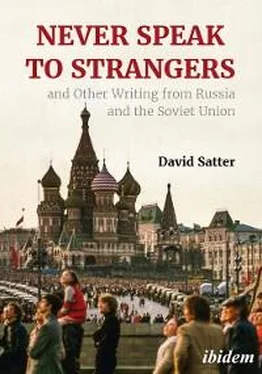Defections by prominent artists and sportsmen with exemplary records of party activism do little to bear out the purported unanimity of Soviet society. Yet the only way to prevent defection is to open the borders which, in the Soviet context, would create enormous pressure for internal liberalisation because it would give people the option of “voting with their feet.”
Closed borders make the Soviet system possible, and since the present Soviet authorities show no readiness to contemplate liberalisation, defection. Le Vice Sovietique , seems likely to shadow the regime’s pretensions for many years to come.
Financial Times, Wednesday, December 19, 1979
Planning and Politics Strangle
the Soviet Economy
The recent speech by Mr. Leonid Brezhnev, the Soviet President, singling out Soviet Ministers for public criticism and threatening officials with the sack was a graphic illustration that the Soviet leadership is deeply upset about the state of the economy.
It was therefore all the more surprising that despite the existence of detailed plans for economic reform, there was no indication in Mr. Brezhnev’s speech that the leaders foresee any change in the economy more basic that tougher punishments for those who fail to reform.
The malaise of the Soviet economy manifests itself in warehouses full of unbought goods, long queues in the snowy streets for household essentials, a ubiquitous black market and statistical tables displaying the worst economic growth rates in more than 30 years.
Soviet national income, a measure similar to GNP, will grow only 2 per cent this year, the worst result since World War Two. Moreover this figure, because it includes shoddy goods which are produced but never purchased, distorts the level of consumption, which in 1979 will probably not increase at all.
In his speech Mr. Brezhnev said the culprits behind each “negligence, lack of responsibility and stupid bungling,” should be found and “punished.” His anger was understandable but the decline in Soviet economic performance stems from the fact that the rigid, centralised system inherited from Joseph Stalin is running down.
This can only be reversed through fundamental reform, not by tighter discipline. Economic and political leadership in the Soviet Union is vested in the Communist Party, and economic decisions reflect political priorities. The factory manager is subordinate not only to the local party committee of which he must be a member but to the department of the Central Committee which oversees his particular branch of industry.
No deviation from the economic plan is legal without party approval, but party leaders are free to commandeer workers to help at construction sites, beautify the city or bring in the harvest. Responsibility for meeting targets lies with the factory manager.
The intention behind all this is to concentrate economic decision-making in the hands of the top party leadership acting through Gosplan, the State planning agency. The Soviet factory manager must execute a blizzard of orders and directives, while his individual role is restricted to maximising output. He is told what to produce, from whom to obtain materials, how many people to employ and what to pay them.
Factory directors have no authority to deal with unexpected contingencies. At a big construction site near Ryazan, for example, a gear broke on some Polish-manufactured excavators. The replacement cost was no more than 250 roubles (about £180), but the new parts could not be ordered direct from Poland.
Instead the project’s chief engineer had to travel to Moscow, wait two weeks for an appointment with the Vice-Minister of Foreign Trade and then see an official in the Ministry of Finance because the purchase of the replacement parts required hard currency. Only with the approval of these officials could an order for the new parts be issued. They took another two months to arrive. In the meantime, the entire project was at a standstill.
Mr. Brezhnev expressed surprise that although the Soviet Union is the world’s larger producer of steel, iron, mineral fertiliser and cement, these basic goods are often in short supply. But this stems from the fact that the country’s highly centralised economic system must measure results on the basis of gross aggregates, which can supposedly be expressed in figures.
The planners set high production targets to force factory managers to make maximum use of men, materials and equipment. But managers protect themselves by overstating their resource requirements, and the system breeds a passion for fictitious results.
An engine factory in Kharkov, for example, satisfied its plan requirements by using 200 KG ingots to produce 30 KG units. The waste of steel was enormous but the factory met its targets because output was calculated on the basic of the value which was presumed to have been added to the material inputs. Reducing the steel order would have saved steel, but reduced the factory’s ostensible output too.
Transport workers who send cargoes back and forth between distant Soviet cities in order to accumulate mileage, or construction engineers who start projects but don’t finish them (unfinished projects have come to 80 per cent of capital investment in recent years) also reflect the logic of a system which rewards plan fulfilment rather than the filling of specific needs.
The relation between waste and the excessive concentration on gross output as an economic indicator was outlined persuasively in November 1977 in the party newspaper Pravda in a series of articles by Mr. Dimitri Valovoi, the paper’s deputy editor. There was no sign in Mr. Brezhnev’s speech, however, of any intention to move to qualitative indicators of economic performance which would require human judgments and vitiate central control.
The rigidity of the Soviet economic structure restricts not just factory managers but apparently ordinary workers as well. Under Stalin the economic system was backed up by political terror. With the passing of that era, increases in labour productivity have steadily declined and labour delinquency has increased. Labour productivity increased only 2.4 per cent during the first nine months of this year against a target of 4.7 per cent. In 1951, it increased more than 10 per cent.
Acute alcoholism is a growing and dangerous problem. Alone among modern countries, the Soviet Union shows declining life expectancy, which fell from 66 in 1966 to 64 in 1972 and has now dropped to the point where a figure for males is no longer published. This is attributed to the effects of alcoholism, and Soviet researchers have estimated that with complete sobriety at the work place, Soviet productivity would increase.
Efficiency is also hampered because the burden of adapting to the needs of the bureaucracy which directs the world’s largest planned economy is placed entirely on the average citizen.
In the early years of Soviet power, centralisation had unquestionable advantages. The Russians were proceeding from an undeveloped industrial base; quantity production and the ability to concentrate on specific objectives were beneficial. Agriculture was depressed and living standards were held down to produce capital for investment. Raw materials were plentiful.
Now, however, with the heavy industry base created, the need for efficiency is paramount because the economy faces an exhaustion of inputs. Oil production will increase only 2 per cent this year and may soon begin to fall. Population growth has levelled off, particularly in the European areas where industrial labour is most badly needed and the area of arable land is expected to decline.
Achieving efficiency would appear to require some measure of liberalisation and decentralisation, with the introduction of qualitative measures of economic performance and greater autonomy for factory managers. This was tried at the time of the Kosygin reform in 1965, but had little practical effect. There is now little likelihood that the Soviet economy will be decentralised, and it is no accident that Mr. Brezhnev failed to mention this as a possibility.
Читать дальше












